Reflections on 28 years of advocacy on air quality and sustainable transport
By Cornie Huizenga, Former Executive Director of Clean Air Asia, Secretary General of SLOCAT Partnership, Co-team leader of Asian Transport Outlook (ATO) and EST Expert Keynote delivered at the occasion of the High-Level 16th Regional Environmentally Sustainable Transport (EST) Forum in …
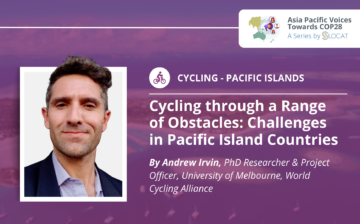
Cycling through a Range of Obstacles: Challenges in Pacific Island Countries
By Andrew Irvin, PhD Researcher & Project Officer, University of Melbourne, World Cycling Alliance Pacific Islands Countries (PICs) face many crises that demand urgent responses. PICs have some of the largest Exclusive Economic Zones and smallest land areas in the …
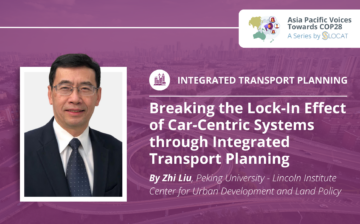
Breaking the Lock-In Effect of Car-Centric Systems through Integrated Transport Planning
By Zhi Liu, Senior Research Fellow and China Program Director, Lincoln Institute of Land Policy, and Director, Peking University—Lincoln Institute Center for Urban Development and Land Policy Integrated transport planning has been practised in many countries and regions around the …
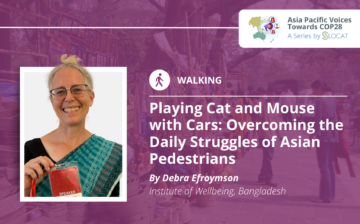
Playing Cat and Mouse with Cars: Overcoming the Daily Struggles of Asian Pedestrians
Walking, the simplest and most environmentally friendly mode of transport, holds tremendous potential for transforming our cities. It’s a mode of mobility that burns no fuel, emits no carbon, fosters community connections, and invigorates local economies. However, pedestrians in many Asian cities find themselves playing a dangerous game of “cat and mouse” with cars, enduring noise, pollution, and perilous street crossings. Despite walking constituting a significant portion of trips in these regions, policymakers often prioritize motorized transport, leaving pedestrians neglected. In this article, Debra Efroymson, Executive Director of the Institute of Wellbeing, Bangladesh, and Senior Advisor at HealthBridge, sheds light on the challenges faced by pedestrians in Asian cities and advocates for prioritizing walkability as a sustainable and equitable urban transport solution.
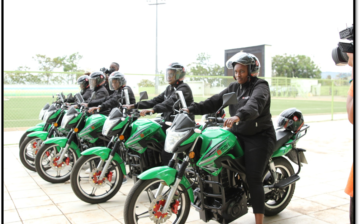
Harnessing Intergovernmental Synergies Toward Green Mobility in Africa
by Jerry Ndayishimiye, Head of Marketing & PR Officer, SUL Mobility An electric van charging at EVP (evpcharger.com) charging station located at Total Energies Kacyiru station in Kigali, Rwanda. While Africa is the least greenhouse gas emitting continent in the …
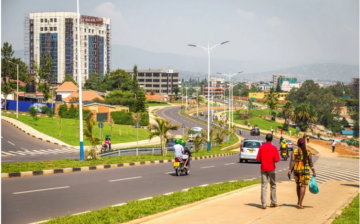
Shaping COP27 around African Climate, Health and Transport Priorities
by Desmond Appiah (Clean Air Fund), Alison Doig (Health and Climate Network) and Karl Peet (SLOCAT Partnership) This is Kigali in Rwanda, “Africa’s cleanest city”. Credit photo by Tim Treza (Afrik Buzz, 2021) There is an urgent need to deliver …
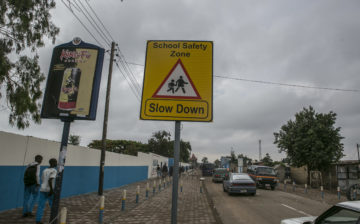
Safer Roads for All in Africa
by Ayikai Poswayo, Programme Director, Amend An exterior view of the Justin Kabwe School in Zambia after SARSAI programme (2017) Credit photo by Amend I remember the day of my undergraduate civil engineering graduation – it was a day of …
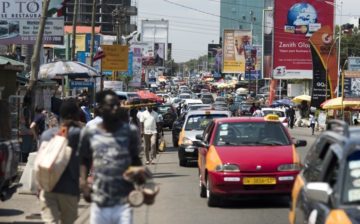
Now Is the Time to Address Africa’s Dependency on Used Vehicle: Ghana’s Story
by Festival Godwin Boateng, Postdoctoral Research Scholar, Columbia Climate School USA Used vehicles in Accra’s streets, Ghana Photo courtesy of Yinka Ibukun, Bloomberg News (2016). The United Nations Environment Programme (UNEP) estimates that more than 60% of the vehicles added to …
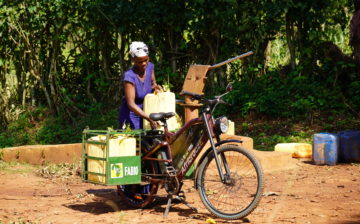
“AFricroozE”: Eco- and Gender-Friendly Electric Bikes to Transform Mobility in Africa
By Najjiba Katesi, Executive Director, First African Bicycle Organisation (FABIO) Namuleme Hadija, a beneficiary of the water e-bike in Uganda The story of Namuleme Hadija is not different from that of many women in Uganda’s rural areas. She is a …
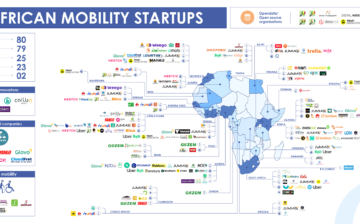
Businesses and Industries for Circular Economy, Local Value Creation and Short and Resilient Logistic Chains in Africa
by Charlène Kouassi, Director, Movin’On LAB Africa (African Mobilities Observatory OMA) Movin’On LAB Africa Mobility startup map (2021 version) For more than a decade, the private sector has been disrupting mobility systems in African cities. In every sector of mobility, …